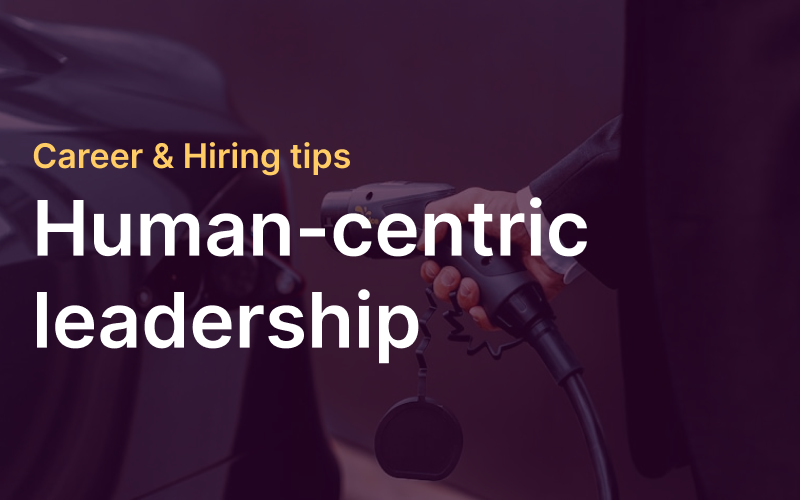1. The shifting demands on leadership in EV charging
The EV charging industry, like many other technology-driven sectors, is inherently focused on innovation and results. While achieving targets and meeting operational goals remain important, they are no longer sufficient to inspire and sustain a workforce. Modern employees crave authentic connections with their leaders and a sense of belonging in their work environment.
This growing need for human connection is echoed in broader workplace trends. Surveys consistently show that employees value leaders who prioritise transparency, mental well-being, and meaningful interactions. In an industry as fast-paced and complex as EV charging, where teams are often dispersed and working in hybrid or remote setups, fostering this connection becomes even more vital.
1.1 The case for human-centric leadership
Traditional leadership approaches, often characterised by rigid hierarchies and a results-first mentality, are losing relevance. Instead, leaders in the EV charging sector must balance achieving business objectives with understanding the emotional and psychological needs of their teams.
Human-centric leadership is not about sacrificing accountability or performance; it’s about recognising that people perform their best when they feel valued, heard, and supported. Transparency, empathy, and trust-building form the cornerstone of this approach. For example, openly discussing challenges and providing regular feedback helps foster an environment where employees feel empowered to contribute to the company’s vision.
1.2 Addressing mental well-being in leadership
In high-pressure industries like EV charging, mental well-being can often be overlooked in favour of productivity. However, studies suggest that employee satisfaction and mental health are directly linked to leadership style. Leaders who prioritise the mental health of their teams—by actively listening, offering support, and promoting work-life balance—cultivate trust and loyalty.
Transparency plays a crucial role here as well. Employees are more likely to share their struggles or ideas if they trust their leader to respond with empathy rather than judgement. When team members feel seen and understood, they are better equipped to tackle challenges, innovate, and work collaboratively towards shared goals.
2. Redefining leadership priorities in a technological world
While the EV charging industry is rooted in cutting-edge technology, leadership must bridge the gap between the technical and the human. Creating a sense of community and fostering connections is essential, especially as digital collaboration becomes the norm.
2.1 Moving beyond traditional authority
Leadership today requires less of the traditional alpha behaviours—like authoritarianism or rigid adherence to hierarchy—and more focus on relational qualities. Leaders who rely solely on logic or metrics to guide their decisions risk alienating their teams. Instead, adopting a collaborative, inclusive approach encourages individuals to bring their whole selves to work, which benefits both morale and productivity.
In the context of EV charging, where innovation often demands creative problem-solving and cross-functional teamwork, this shift in leadership style is particularly impactful. Encouraging open dialogue and valuing diverse perspectives can lead to more innovative solutions and stronger team cohesion.
2.2 The power of connection in hybrid and remote work
One of the challenges facing leaders in the EV charging industry is maintaining connection in increasingly remote or hybrid work environments. Contrary to assumptions, research shows that physical proximity is less important than having an engaged, communicative manager.
Building connection in a digital workplace requires intentionality. Simple acts, like checking in with team members regularly or celebrating their successes, can go a long way in creating a sense of community. Leaders must also be mindful of how they communicate, ensuring that every interaction reinforces trust and inclusivity.
Conclusion: leadership for a connected future
As the EV charging industry continues to grow and evolve, so too must its leaders. A human-centric leadership approach, focused on connection rather than pure logic, is not just a trend but a necessity. By fostering transparency, empathy, and trust, leaders can create an environment where employees feel empowered and engaged.
In a sector where technological innovation is paramount, it’s easy to overlook the human aspect. But the true strength of any organisation lies in its people. By prioritising connection and well-being, leaders in the EV charging industry can inspire their teams to drive innovation, tackle challenges, and achieve sustainable growth—all while creating a workplace where people truly thrive.
Partner with EVBoosters for tailored talent solutions
At EVBoosters, we understand your unique challenges as a startup or scale-up navigating your charging business. From securing investment to scaling operations and meeting market demands, the journey is complex—and finding the right talent is critical to success. That’s where we come in.
Reach out to Paul Jan Jacobs today, and let’s work together to find the leaders, professionals and experts who will shape the EV charging industry’s success.

